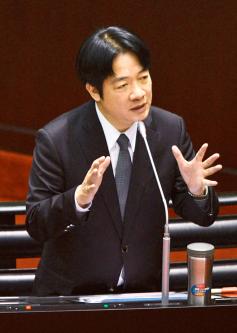Taiwan is a sovereign nation whose official title is the Republic of China, Premier William Lai (賴清德) said yesterday, adding that “the two sides of the Taiwan Strait are independent of each other.”
Lai made the remarks when asked to clarify his cross-strait policy during a question-and-answer session at the legislature with People First Party Legislator Chen Yi-chieh (陳怡潔).
When asked whether his cross-strait policy of “showing an affinity toward China while loving Taiwan” contradicts President Tsai Ing-wen’s (蔡英文) policy of maintaining the “status quo,” Lai said it does not.
“Showing an affinity toward China while loving Taiwan is based on a Taiwan-centric perspective, whereby we extend a hand of friendship to convey goodwill,” Lai said.
“Hopefully, through exchanges, the two sides will be able to improve mutual understanding, reconciliation and forgiveness, thereby achieving peaceful development,” he said.
The premier added that he would follow Tsai’s policy for Taiwan and China to engage in mutually beneficial collaboration and continue to convey goodwill, while not yielding to political pressure.
Asked whether he felt he had a responsibility to improve cross-strait ties, Lai said he believes Taiwan and China should work together, since they have common goals, as well as common “enemies.”
These common enemies include typhoons, AIDS and pandemics, while their common goals should be set with the intent of improving the welfare of people on both sides of the Taiwan Strait, which underpins cross-strait exchanges, Lai said.
Asked about China’s Taiwan Affairs Office Minister Zhang Zijun (張志軍) comment that he did not have any expectations upon learning that Lai had been named premier, Lai said: “Taiwan is a sovereign nation. Its goal is to serve the best interests of people on both sides [of the Strait]. We need not subject ourselves to a framework imposed by a superpower and there is absolutely no reason to care about certain people’s remarks.”
Chinese Nationalist Party (KMT) caucus secretary-general Lin Wei-chou (林為洲) and vice secretary-general Wang Hui-mei (王惠美) also asked the premier to elaborate on his cross-strait policy.
“As I said before at the Tainan City Council, I am without a doubt a politician who supports Taiwanese independence. I will never change this stance no matter what office I hold,” Lai said.
His support for independence does not contradict his “affinity” remark, he added.
Lin asked Lai whether Tsai is considering reforming the nation’s semi-presidential system with her pledge to form a government whose power is proportionate to its accountability when she unveiled plans to push for constitutional reforms on Sunday.
He also asked Lai whether constitutional reforms espoused by the Democratic Progressive Party (DPP) would involve changing the nation’s title and territory, since the Constitution, promulgated in Nanjing in 1947, includes China as the ROC’s territory.
Lai said that constitutional reforms must be carried out on the strength of public opinion, which would shape the reforms, so it is unnecessary to become overly worried about the issues brought up by Lin.
The government would value draft constitutional amendments tendered by the KMT, he added.
Lai also reaffirmed the DPP administration’s resolve to achieve a “nuclear-free homeland” by 2025.
The DPP administration has no choice but to achieve a balance of 50 percent coal-fired power, 30 percent natural gas and 20 percent renewables by 2025, given that all nuclear power plants are set to be decommissioned by 2024 under the Electricity Act (電業法), Lai said.
He reiterated the administration’s goal to boost the nation’s energy reserves from 10 percent to 15 percent.
Wang warned Lai about the potential pitfall of making natural gas one of the nation’s baseloads for energy supply, citing difficulties in replenishing it.
Lin urged Lai to advise Tsai to adjust the government’s “five plus two” initiative to upgrade and transition the nation’s industries, which he said “misses the point.”
Quoting Taiwan Semiconductor Manufacturing Co chairman Morris Chang (張忠謀), Lin said the greatest challenge facing the nation’s industries are shortages of water and electricity supply, workers, talent and land, and called on Tsai to tackle these issues rather than propose a policy that is out of touch with the private sector.
Source: Taipei Times - 2017/09/27





















